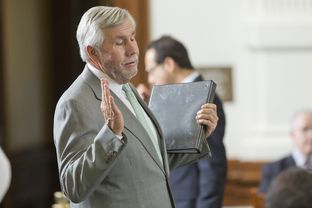With Session Over, Election Season Has Begun

Talk has shifted quickly to next year’s party primaries now that the Legislature has left town.
Initial talk focused on a pair of state Senate seats: the East Texas district currently held by newly installed Senate President Pro Tem Kevin Eltife and the Central Texas district being relinquished by Troy Fraser.
Eltife, who famously said earlier this session that politicians who talk about re-election during session should be shot, has not announced whether he’s running for re-election. He told the Tribune, though, that he won’t dally in making a decision and could reach a decision within a couple of weeks.
A pair of House members, meanwhile, told the Tribune that they are eyeing a run for the Senate seat. Longview Republican David Simpson re-launched his website with a countdown clock ticking to June 22, the first day that members can begin fundraising after session, as a date when he will make an announcement about his “next campaign.”
Mineola Republican Bryan Hughes is also weighing a run, with a spokesman telling the Tribune that Hughes is basing his decision “on whether or not Sen. Eltife steps out.”
Also expressing interest in the Eltife seat if it comes open is Thomas Ratliff, the son of former state Sen. Bill Ratliff. He announced this week that he won’t seek re-election to the State Board of Education and indicated that he would consider a run for the Senate should Eltife not stand for re-election.
Would-be candidates who are taking themselves out of the running are former Tyler Mayor Barbara Bass and Tea Party activist JoAnn Fleming.
*****
For the Fraser seat, there's already an announced candidate — Dawn Buckingham, an Austin ophthalmologist.
She is a familiar face around the Capitol. Active in the Texas Medical Association, where she chairs the medical society’s council on legislation, she is also currently serving as a public member on the Sunset Advisory Commission.
In 2014, she won a seat on the Lake Travis ISD’s board of trustees.
Fraser’s sprawling SD-24 takes in parts of 10 House districts, which means there is no shortage of potential candidates.
Here are the six representatives who received more than 10,000 votes from within SD-24 in the 2014 elections: Andrew Murr, R-Junction (23,117); Molly White, R-Belton (18,278); Jimmie Don Aycock, R-Killeen (17,190); Susan King, R-Abilene (16,360); J.D. Sheffield, R-Gatesville (14,148); and Paul Workman, R-Austin (12,343).
Of those six, Aycock, who announced this week that he's not seeking re-election to his House seat, has already said that he won’t run for the Fraser seat.
King’s husband, Austin King, is a former president of the Texas Medical Association. That could put the group in a tough spot should she run against Buckingham.
*****
Talking on Thursday morning with the Tribune’s Evan Smith, Lt. Gov. Dan Patrick cited the 30-1 vote to adopt the final version of the budget as evidence of the bipartisan support that he said has been there for a lot of bills this session.
Conservatives want to work with others, he said.
We took a look back at the final votes taken by the Senate on the budget for the past several sessions, and here’s what we found.
In Patrick’s first session as the Senate’s presiding officer, the body was the most unified in voting for the budget since 2005.
Four Republican Senators, including Patrick, voted against the budget in 2013. In the difficult budget year of 2011, 11 Democrats voted against the budget.
Two Democrats — Mario Gallegos and Eliot Shapleigh — voted no on the 2009 budget while five Republicans voted no in 2007. Patrick was again a no vote that year.
In 2005, Shapleigh was that lone no vote.
*****
On the House side, a single Republican, David Simpson, sided with 32 Democrats against the budget this year.
That stands in stark contrast to 2013, when the House voted unanimously for the budget. But that level of unity is relatively rare when it comes to adopting budgets.
Fifty-three members voted no on the budget in 2011, a half dozen of whom were Republicans.
In recent sessions, Republicans haven’t been too reticent about joining Democrats in voting no against the budget.
In 2005, 11 Republicans joined 29 Democrats in voting against the budget. A half dozen Republicans were among the 35 no votes in 2007.
The outlier is the vote in 2009, when two Republicans — Joe Crabb and Sid Miller — were the only no votes on the budget.

